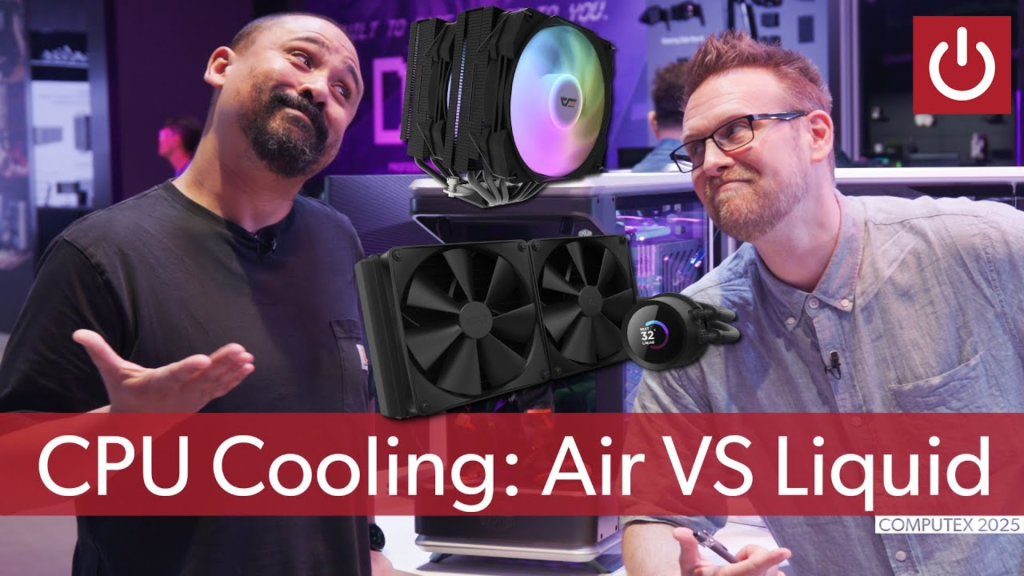As every PC enthusiast knows, keeping your processor cool is crucial for maintaining performance and longevity. However, the debate rages on regarding the best method for achieving effective cooling. Traditional air cooling systems have long been the standard, relying on heatsinks and fans. Conversely, the adoption of all-in-one (AIO) liquid cooling solutions has surged in popularity, particularly among those building high-end gaming rigs and workstations. But which cooling method reigns supreme? Recent discussions, such as one held by PCWorld’s Adam Patrick Murray with Nick from Gear Seekers at Computex 2025, shed light on this perennial question.
The Cooling Conundrum: Air vs. Liquid
When comparing air and liquid cooling, there are several factors to consider. Each method has its distinct advantages and disadvantages that can impact a user’s decision based on their specific needs and experience level.
- Performance: Liquid cooling typically has an edge when it comes to maintaining optimal CPU temperatures, especially under heavy loads. This makes it preferable for users who overclock their CPUs or operate demanding applications. According to a benchmark study by Tom’s Hardware, premium AIO liquid coolers can achieve temperatures up to 15°C lower than high-end air coolers.
- Noise Levels: Generally, liquid cooling systems tend to operate more quietly than air coolers. However, it is essential to note that some AIO setups are equipped with cooling pumps that can be quite noisy, turning the perceived advantage into a disadvantage. A user review on Reddit highlighted how a faulty pump led to a noticeable noise issue that detracted from their overall build experience.
- Installation Ease: Air coolers often feature simpler installation processes, which can be a crucial factor for novice builders. Liquid cooling systems, particularly AIOs, usually require more time and understanding to set up correctly, especially if you want to ensure optimal thermal performance.
- Maintenance: Cleaning air coolers is typically straightforward, requiring little more than removing dust buildup from the heatsink and fans. In contrast, AIO liquid coolers can pose more of a challenge—while they are designed to be maintenance-free, users may face issues with leaks or airflow blockages.
Cost Considerations
When evaluating which cooling method offers better value, air coolers frequently come out ahead in cost-effectiveness. A high-quality air cooler can provide sufficient cooling performance at a fraction of the price of a premium AIO liquid cooler. As noted in their Computex discussion, both Adam and Nick agreed that for users on a budget, air cooling remains the best option due to its straightforward design and reliability.
For those building their PCs, it is crucial to consider your overall budget and future needs. For example, a mid-range air cooler can be purchased for as little as $30, while an AIO liquid cooler can cost upwards of $100. However, investing in higher-end components might be worthwhile if your build requires advanced thermal management and features like RGB lighting.
Personal Preferences and Long-Term Considerations
Ultimately, personal preference plays a significant role in choosing between air and liquid cooling solutions. Many seasoned builders may have their biases based on past experiences, while newcomers may prioritize ease of use. Users should also consider the long-term implications of their choice. While air coolers are typically more durable and reliable over time, liquid cooling can provide excellent performance but may involve more concerns regarding maintenance and potential failures.
Market Trends and Community Insights
As the PC gaming and building community continues to grow, so too does the interest in both cooling methods. Recent statistics from Statista indicate a consistent increase in PC gaming hardware sales, pointing toward an expanding market for both air and liquid cooling solutions. The community often shares insights and reviews both on forums and social media platforms like Twitter and Reddit, helping others make informed decisions.
Whether one chooses air or liquid cooling, it is essential to assess personal needs, budget, and the specific performance targets of the build. As technology continues to advance, both cooling methods will evolve, possibly leading to new innovations that could shift the balance between air and liquid cooling once again.
Quick Reference Table
| Aspect | Air Cooling | Liquid Cooling |
|---|---|---|
| Performance | Good for general use | Excellent for high loads |
| Noise Levels | Moderate | Variable, can be lower |
| Ease of Installation | Easy | More complex |
| Maintenance | Low | Variable |
| Cost | Affordable | Higher initial investment |

